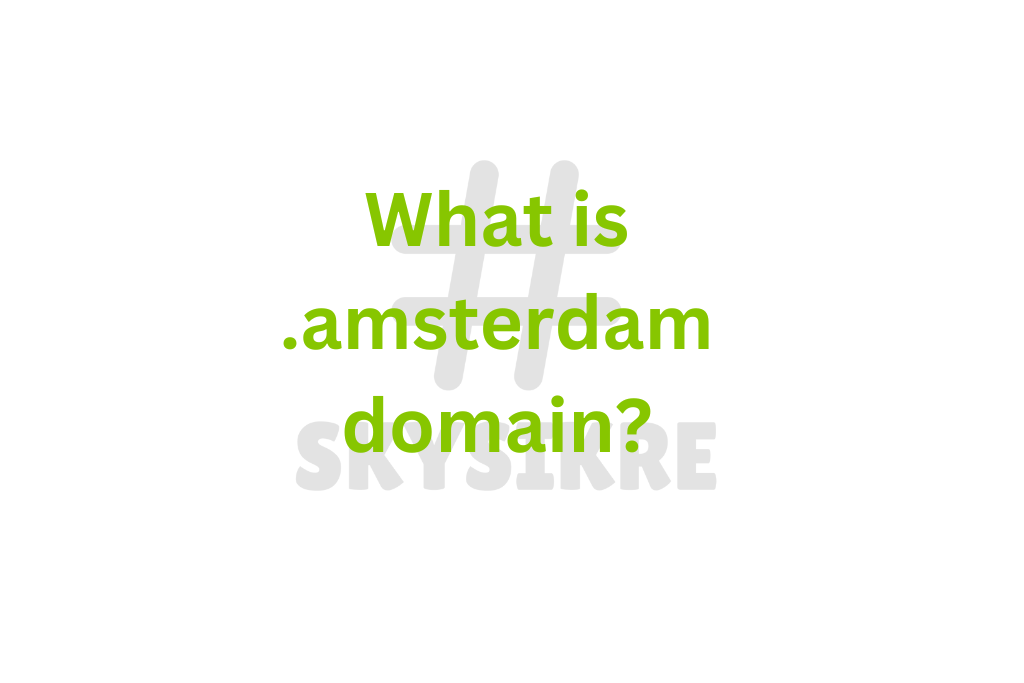Introduction to .Amsterdam Domain
The .Amsterdam domain is a specialized top-level domain (TLD) that serves as a digital identifier for entities associated with the city of Amsterdam, Netherlands. Launched in 2014, this domain extension aims to enhance the online presence of both businesses and organizations linked to the Dutch capital, allowing them to showcase their connection to this vibrant city and its unique culture. By using a .Amsterdam domain, individuals, companies, and institutions can better position themselves within the local community and attract more relevant traffic to their websites.
In a landscape saturated with generic domain names, the .Amsterdam TLD stands out as a compelling option for those looking to create a more localized online identity. This domain is particularly beneficial for businesses that operate within the city, such as restaurants, shops, and service providers, as well as cultural organizations, event planners, and various municipalities. Furthermore, the .Amsterdam domain promotes a sense of pride and belonging among local residents and tourists alike, making it a significant asset in the digital world.
As part of a broader trend towards specialized domain extensions, the .Amsterdam domain exemplifies the growing importance of localized branding in an increasingly globalized online market. This TLD not only reflects the history and culture of Amsterdam but also reinforces its position as a hub for innovation, creativity, and sustainable living. As more entities recognize the value of establishing a dedicated online presence, the .Amsterdam domain strengthens its relevance and plays a crucial role in connecting users to the rich tapestry of life that the city offers.
History of .Amsterdam Domain
The .Amsterdam domain was officially launched on May 16, 2014, as part of the Internet Corporation for Assigned Names and Numbers (ICANN) program aimed at expanding the domain name system by introducing new generic top-level domains (gTLDs). The .Amsterdam domain specifically caters to the city of Amsterdam, serving as a digital representation of the vibrant culture, history, and innovative spirit of the city.
The establishment of the .Amsterdam domain was initiated by the City of Amsterdam, which recognized the need for a dedicated online space that reflects its unique identity. The organization responsible for the registration and management of the domain is the Amsterdam City Council, which collaborated with various stakeholders, including local businesses, residents, and institutions. This collaboration aimed to ensure that the domain would serve as a platform for promoting local content and fostering community engagement.
Benefits of Using .Amsterdam Domain
The .Amsterdam domain offers a unique advantage to businesses, individuals, and organizations looking to establish a strong online presence in the vibrant city of Amsterdam. One of the most significant benefits of using this domain is the enhancement of brand identity. By incorporating the .Amsterdam extension, entities can effectively communicate their local roots and connection to the region, which can be vital in a crowded digital marketplace. This localized domain signals to consumers that the brand is intertwined with the local culture and community, fostering a sense of belonging and loyalty.
Moreover, the .Amsterdam domain provides substantial local relevance, which can be invaluable for businesses targeting local clientele. In an increasingly globalized digital environment, entities that use a domain specific to their location can better position themselves in the eyes of potential customers. This local focus not only aids in reaching the target market but also helps in distinguishing the website from competitors that may use less relevant domain extensions.
From a search engine optimization (SEO) perspective, utilizing a .Amsterdam domain can yield significant benefits. Search engines often prioritize local results for users who are searching for services geographically. Consequently, websites utilizing this specific domain may perform better in search results for local queries. Additionally, local businesses can leverage this domain to create content that is personalized for Amsterdam residents, leading to higher engagement rates and improved search rankings.
Finally, adopting a .Amsterdam domain can enhance trust-building with local audiences. Consumers are more likely to engage with sites that they perceive as authentic and representative of their region. By choosing a domain that reflects a commitment to Amsterdam and its community, organizations can inspire confidence among their audience, facilitating deeper connections and increased customer retention.
Target Audience and Usage
The .Amsterdam domain serves as a unique digital identifier that resonates particularly well with entities and individuals connected to the vibrant city of Amsterdam. It appeals to a diverse target audience, including local businesses, tourism-related organizations, cultural institutions, and residents. The .Amsterdam domain is a powerful tool for establishing a local online presence that reflects the cultural richness and community spirit of this iconic city.
Local businesses, ranging from restaurants and shops to services such as hair salons and legal firms, can greatly benefit from utilizing a .Amsterdam domain. For instance, a local café might use this domain to enhance its brand recognition by incorporating the city’s name directly into its web address, thereby appealing to both residents and tourists looking to explore authentic dining experiences in Amsterdam.
Tourism entities, including hotels, museums, and event organizers, also find value in the .Amsterdam domain. By developing websites that leverage this domain, they can effectively target visitors planning their trips to the city. For example, a museum could create a website using the .Amsterdam domain to showcase its exhibitions and events, making it clear that its offerings are intrinsic to the cultural landscape of Amsterdam.
Cultural organizations and community groups utilize the .Amsterdam domain to foster deep connections within the local community. This could include initiatives that promote local artists or community events, thereby increasing visibility and engagement among residents. A community theater might adopt the .Amsterdam domain to attract local audiences and provide information about performances.
Ultimately, the .Amsterdam domain proves to be a versatile option for various stakeholders in Amsterdam, facilitating a strong online presence that emphasizes local flavor and authenticity.
How to Register a .Amsterdam Domain
Registering a .Amsterdam domain is a straightforward process, but it requires attention to detail and adherence to specific guidelines. To begin, ensure you meet the eligibility criteria, as the .Amsterdam domain is generally intended for individuals and organizations that have a connection to the city of Amsterdam. This can include residents, businesses operating within the city, or entities that engage in activities associated with Amsterdam.
Once eligibility is established, the next step is to choose a reputable domain registrar approved by the Stichting .AMSTERDAM, the organization responsible for administering the .Amsterdam domain. Popular registrars include large entities such as GoDaddy and Namecheap, among others. Visit their websites to compare pricing, services, and user reviews to make an informed choice.
After selecting a registrar, navigate to their domain search tool and enter your preferred .Amsterdam domain name. It is crucial to select a name that not only reflects your purpose but also adheres to the domain’s unique extension. If your desired name is already registered, consider variations or related keywords that still resonate with your brand but maintain the .Amsterdam identity.
The registration process typically involves filling out an online form with your personal or organizational details, ensuring the provided information is accurate. You will also need to create an account with the registrar, followed by payment of the registration fees. Payment methods vary by registrar, so it is advisable to check available options beforehand.
Finally, after securing your .Amsterdam domain, keep track of the renewal dates and protect your domain with WHOIS privacy protection, if available. This will help prevent unauthorized access to your personal information. Following these steps will facilitate a smooth domain registration process, allowing you to establish your online presence under the distinct .Amsterdam extension.
Comparison with Other Geographic Domains
The emergence of geographic top-level domains (gTLDs) has enabled cities and regions to establish their unique online presence. The .Amsterdam domain, specifically catering to the Netherlands’ capital, offers distinct advantages that can be compared with other prominent geographic domains like .NYC for New York City, and .LONDON, serving London, as well as country-specific domains such as .NL for the Netherlands. Understanding these differences helps to elucidate what is .Amsterdam domain in relation to its counterparts.
One of the primary distinctions among these domains is branding. The .Amsterdam domain allows businesses and organizations located in or closely associated with Amsterdam to create a strong local identity. Similarly, .NYC provides a platform for New York-based entities to emphasize their local roots, while .LONDON conveys a clear connection to the UK capital. This geographical specificity not only strengthens branding efforts but also fosters community engagement, enhancing the overall digital footprint for those operating within these locales.
When considering audience reach, each domain occupies a unique space. The .Amsterdam domain primarily targets local residents, tourists, and businesses, effectively narrowing its audience to individuals with a pronounced interest in the city. Conversely, .NYC and .LONDON also attract international attention, likely drawing users interested in these iconic metropolises. Country-specific domains like .NL may serve a broader national audience but typically lack the personalization associated with city-specific domains.
Additionally, specific advantages can be tied to each geographic domain. The .Amsterdam domain offers local SEO benefits that enhance visibility in searches related to the city, making it invaluable for businesses seeking to reach a defined demographic. The clear geographical markers of these domains assist users in identifying the nature of services or organizations, thereby improving the likelihood of engagement.
SEO Implications of Using .Amsterdam Domain
The integration of a .Amsterdam domain can significantly influence search engine optimization (SEO) strategies for businesses and websites targeting the Amsterdam area. One of the primary benefits of using a .Amsterdam domain is its potential to enhance local SEO. By adopting this geographical domain, organizations can signal to search engines that their content is relevant to users searching for services or information specific to Amsterdam. This localization helps in improving visibility in local search results, thereby attracting a more targeted audience.
Moreover, a domain that is inherently linked to a city, such as .Amsterdam, can elevate the domain authority for local businesses. Search engines like Google prioritize local relevance and quality content, and a .Amsterdam domain inherently communicates this relevance. Businesses that utilize this domain can more effectively engage with the local community, which is crucial for attracting foot traffic and local customers. When combined with a robust content marketing strategy that highlights local events, attractions, or services, the .Amsterdam domain can solidify a website’s standing in local search results.
To optimize the content effectively for the .Amsterdam domain, webmasters should consider incorporating local keywords related to their industry and services. This strategy includes leveraging phrases that reflect the local market, culture, and consumer behavior in Amsterdam. Additionally, utilizing local backlinks from other reputable Amsterdam websites can further enhance authority and search ranking. A focus on local SEO practices, such as creating location-specific landing pages and engaging with local social media platforms, can also drive organic traffic and increase conversions. Thus, using a .Amsterdam domain presents a strategic advantage for those aiming to dominate search visibility in this vibrant city.
Case Studies: Successful .Amsterdam Domain Users
The .Amsterdam domain has attracted various businesses and organizations seeking to showcase their connection to the vibrant city of Amsterdam. These case studies highlight successful implementations of the .Amsterdam domain, illustrating how brands leverage their local identity to enhance visibility and engagement.
One notable example is the renowned tourism agency, Amsterdam Explore. By adopting the .Amsterdam domain, this agency effectively established a strong online presence that resonated with both international tourists and local residents. Their website, amsterdamexplore.amsterdam, reflects their commitment to promoting the city’s rich culture, events, and attractions. This localization strategy has enabled them to appeal directly to their target audience while significantly increasing organic search traffic, which in turn has boosted bookings and customer engagement.
Another case study is the local artisan market, De Amsterdamse Markt. Utilizing the .Amsterdam domain, deamsterdamsemarkt.amsterdam, they successfully created an online platform to connect local vendors with consumers. This domain not only emphasizes their identity as a local marketplace but also reinforces their commitment to supporting Amsterdam’s small businesses. The market’s website features vendor profiles, event announcements, and product listings, ultimately enhancing customer awareness and foot traffic to their physical location.
Furthermore, the non-profit organization, Green Amsterdam, illustrates the .Amsterdam domain’s potential for community-driven initiatives. Their website, green.amsterdam, serves as a hub for environmental awareness campaigns and city-wide sustainability projects. By adopting a local domain, they foster a sense of community and encourage citizen participation in ecological efforts. Through regular engagement and informative content, they have successfully attracted attention and support for various environmental initiatives across the city.
These case studies exemplify the versatility and effectiveness of the .Amsterdam domain for different sectors. Businesses and organizations adopting this domain can leverage its local relevance, improve visibility, and foster more profound connections with their audience, thereby achieving meaningful outcomes.
Future of the .Amsterdam Domain
The .Amsterdam domain is poised for significant growth as the digital landscape continues to evolve. As trends indicate a shift towards localized internet presence, the relevance of geographic domains like .Amsterdam is expected to increase. This domain provides a unique opportunity for businesses, organizations, and individuals operating within or connected to Amsterdam to establish a distinct digital identity. The ability to incorporate the city’s name directly into a web address can foster a sense of community and enhance brand recognition among local audiences.
Furthermore, as the global internet user base continues to expand, there is an opportunity for the .Amsterdam domain to attract international attention. Companies looking to penetrate the Dutch market may find value in using a .Amsterdam address to signal their commitment to engagement with local culture and commerce. The domain could serve not only residents but also tourists eager to explore Amsterdam’s offerings online, making it a valuable asset for businesses aiming to capitalize on both local and international traffic.
In addition to potential growth, technological advancements and regulatory changes are likely to shape the future of the .Amsterdam domain. Innovations in web hosting and enhanced cybersecurity measures can lead to an improved user experience and greater trust among consumers. As local governance evolves to regulate internet usage, the .Amsterdam domain is likely to benefit from policies aimed at supporting local business and innovation. Expert predictions suggest that, coupled with an increase in remote work dynamics, localized domains will become even more essential in fostering online communities.
In conclusion, the .Amsterdam domain presents a promising future with opportunities for growth, enhanced local engagement, and adaptation to new technological and regulatory landscapes. As the digital environment continues to change, maintaining an online presence tied to geographical identity will likely remain an important asset for businesses and individuals alike.






